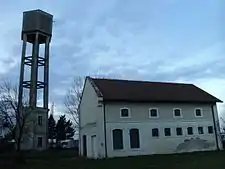Danica concentration camp
Danica was the first concentration and extermination camp established in the Independent State of Croatia during World War II.[1] It was established in Koprivnica (modern-day Croatia) on 15[2] or 20 April 1941[3] in the deserted building of former fertilizer factory "Danica".[4] Mijo Babić participated in preparations for the establishment of Danica concentration camp[5] The first individual inmates were brought to Danica on 18 April 1941 while first groups arrived at the end of April 1941.[6]
| Danica concentration camp | |
|---|---|
| Concentration and extermination camp | |
 The memorial museum and guard tower of Danica Memorial Area | |
| Coordinates | 46°9′36″N 16°49′48″E |
| Location | Koprivnica, Independent State of Croatia (now Croatia) |
| Built by | Mijo Babić, the first commander of all concentration camps in the Independent State of Croatia |
| Operated by | Independent State of Croatia |
| Operational | April 1941–1945 |
| Number of inmates | 5,000 most of them being Serbs followed by Croat communists, Jews and Romani people |
| Notable inmates | |
The Jews from Zagreb were transported to Danica and Jadovno early in May 1941. Those transported to Danica were all killed by July 1941, while those transported to Jadovno were all killed by August 1941.[7] Already in June 1941 there were 2,000 inmates in Danica, most of them being Serbs followed by Croat communists, Jews and Romani people.[8] The number of inmates reached 5,000 including 500 Jews.[9]
Four hundred Romani were transported to Danica camp, some of them executed in the camp.[10]
References
- Bulatović 1990, p. 78.
- www.utilis.biz, Utilis d.o.o., Zagreb. "JUSP Jasenovac - CAMPS IN THE INDEPENDENT STATE OF CROATIA". www.jusp-jasenovac.hr. Retrieved 2017-02-04.
The first Ustasha concentration camp in the Independent State of Croatia, Danica, was founded on 15 April 1941 near Koprivnica.
- Council 1991, p. 12: "April 20: The first concentration camp in Yugoslavia, Danica. near Virovitica, opens; "
- Bulatović 1990, p. 70: "... u prostorijama fabrike »Danica«, podignut je 29. aprila 1941. godine prvi ustaški koncentracioni logor."
- Goldstein & Goldstein 2001, p. 268.
- "Hapšenje 165 jevrejskih omladinaca u Zagrebu u maju 1941. godine | Јадовно 1941". jadovno.com. Retrieved 2017-02-04.
U logor „Danica“ prvi pojedinačni logoraši smještaju se 18. travnja, a potkraj mjeseca stižu i veće grupe...
- Cymet, David (2012-07-10). History vs. Apologetics: The Holocaust, the Third Reich, and the Catholic Church. Lexington Books. p. 337. ISBN 9780739132951.
- Friedman 2010, p. 294.
- Council 1991, p. 12: "5,000 prisoners, including 500 Jews, are its first inmates"
- Weiss-Wendt, Anton (2013-06-30). The Nazi Genocide of the Roma: Reassessment and Commemoration. Berghahn Books. p. 94. ISBN 9780857458438.
Nevertheless, four hundred Gypsies had apparently been deported to the Danica concentration camp in northern Croatia, where a part of them were executed
Sources
- Bulatović, Radomir (1990). Koncentracioni logor Jasenovac s posebnim osvrtom na Donju Gradinu: istorijsko-sociološka i antropološka studija. Svjetlost.
- Goldstein, Ivo; Goldstein, Slavko (2001). Holokaust u Zagrebu. Novi liber. ISBN 9789536045198.
- Friedman, Jonathan C. (15 December 2010). The Routledge History of the Holocaust. Taylor & Francis. ISBN 978-1-136-87060-6.
- Council, United States Holocaust Memorial (1991). Days of remembrance, April 7-14, 1991: fifty years ago : from terror to systematic murder : planning guide. U.S. Holocaust Memorial Council.
Further reading
- Zdravko Dizdar, “Ljudski gubici logora 'Danica' kraj Koprivnice 1941–1942,” Cˇasopis za suvremenu povijest, vol. 34, no. 2 (2002)